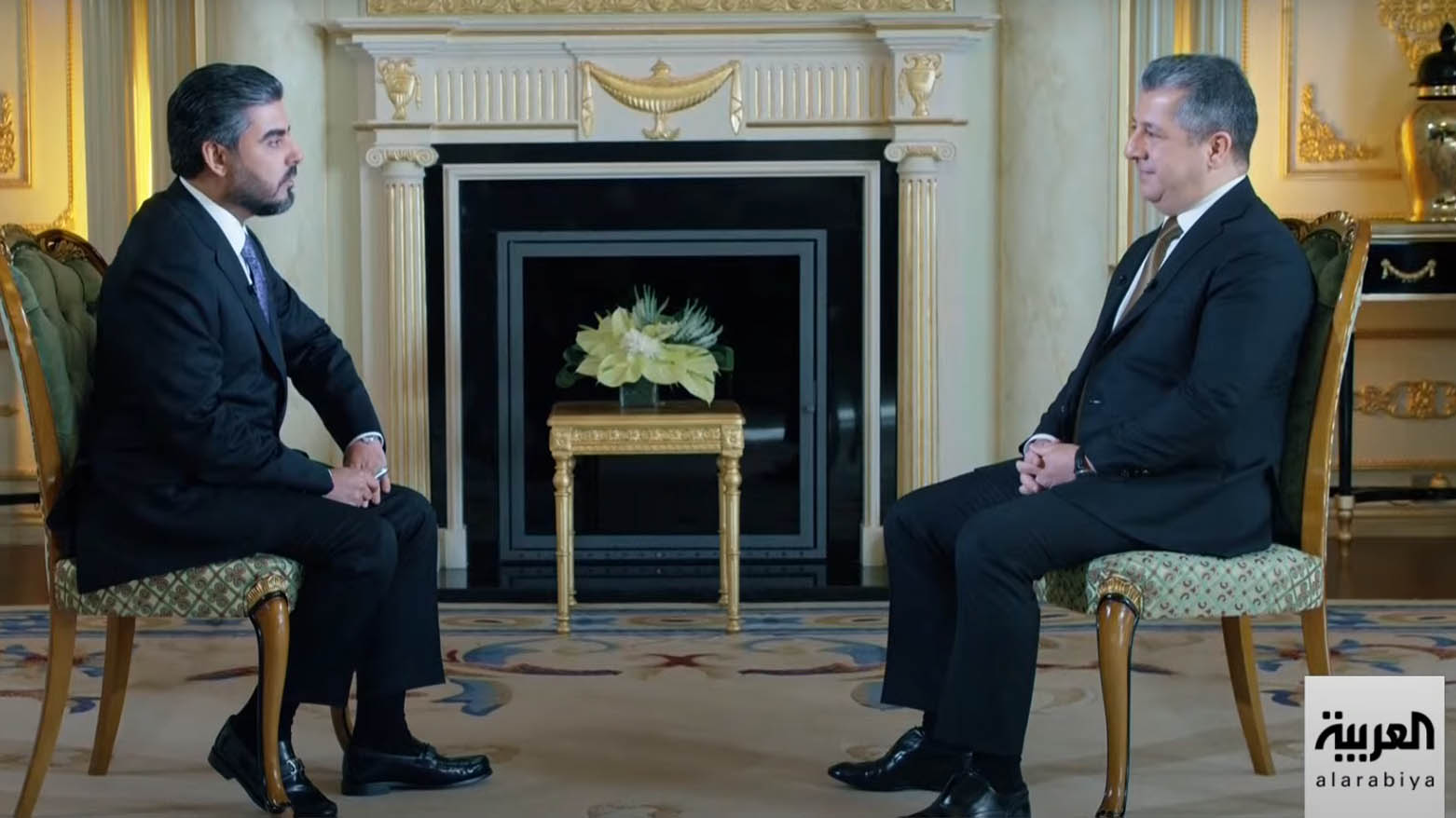PM Barzani expressed his commitment to strengthening Erbil-Baghdad relations
Speaking with Al-Arabiya journalist Majid Hamid, Prime Minister Masrour Barzani acknowledged the improvement in relations under Iraqi Prime Minister Mohammed Shia al-Sudani but stressed that key issues remain.

ERBIL (Kurdistan24) – In an exclusive interview with Al-Arabiya and Al-Hadath which was released on Saturday, Kurdistan Region Prime Minister Masrour Barzani expressed his commitment to strengthening relations between Erbil and Baghdad, while highlighting unresolved territorial disputes and national identity issues as major challenges for the region.
Speaking with Al-Arabiya journalist Majid Hamid, Prime Minister Masrour Barzani acknowledged the improvement in relations under Iraqi Prime Minister Mohammed Shia al-Sudani but stressed that key issues remain. "We would like to be genuine partners in the Iraqi government," Barzani said. "Though relations have improved, unresolved problems, particularly related to land disputes, continue to strain our partnership."
National Identity and Territorial Disputes: A Historical Challenge
Barzani explained that the issues between Erbil and Baghdad go beyond economic concerns, such as salaries and budget allocations. He emphasized that the core problem is rooted in the historical Kurdish struggle for national identity and territorial rights.
"Our problem is much larger than salaries. The Kurdish issue in the Middle East, particularly in Iraq, has a deep historical depth, especially after the formation of the Iraqi state," he said. "The Iraqi state should have been founded on the principle of two main communities—Kurds and Arabs—along with other groups. Our greatest challenge remains national identity and territorial disputes, particularly in disputed territories, along with issues like oil and gas law."
Barzani stressed the importance of the Iraqi constitution as the foundation for resolving these issues. "The constitution should be the basis for negotiations, respected by all parties. While some believe that our rights are not fully guaranteed, the constitution remains the best framework for achieving lasting solutions," he stated.
Oil Export Suspension Costs the Iraqi Economy $19 Billion
On the issue of oil exports, Barzani highlighted the significant economic losses resulting from the suspension of oil exports from the Kurdistan Region. He pointed out that the halt had cost the Iraqi economy more than $19 billion, emphasizing the need for a swift resolution.
"If there is political will in Baghdad, the solution is simple," Barzani remarked. "The export of oil from the Kurdistan Region benefits all Iraqis, and the suspension has been detrimental to the entire country. The cost of production, especially in the Kurdistan Region where heavy oil is extracted, must be recognized in the budget. It is unrealistic to apply a single production cost across all regions."
Kurdistan Committed to Constitution and Cooperation
Addressing accusations of oil smuggling and fake payroll entries, Barzani rejected these claims as unfounded, reiterating the Kurdistan Region's commitment to upholding its obligations to the federal government. "The Kurdistan Region has fulfilled its financial commitments to Baghdad, despite not receiving its full share of the budget," he said. "These accusations are baseless and politically motivated."
He also criticized attempts to marginalize the role of the Kurdistan Region in Iraq’s governance. "The new Iraq, after the constitution, was meant to belong to all Iraqis. We must be recognized as equal partners in this system," Barzani said, urging respect for the constitutional status of the Kurdistan Region.
No Israeli Bases in Kurdistan, Barzani Affirms
Barzani also addressed rumors surrounding the presence of Israeli bases in the Kurdistan Region, dismissing them as false. "There are no Israeli bases in the Kurdistan Region. This has been thoroughly investigated, and there is no evidence to support these claims," he stated, calling on the Islamic Republic of Iran to provide proof if they continue to make such accusations.
PKK Presence Undermines Regional Security
In the interview, Barzani criticized the Kurdistan Workers' Party (PKK) for undermining regional stability, particularly in areas like Sinjar. "The PKK’s presence does not serve the interests of the Kurdistan Region or the security of Iraq," Barzani said, urging the implementation of a previous agreement between the Kurdistan Regional Government and Baghdad, which calls for the removal of all outlawed armed groups from these areas.
"The situation in the disputed territories prevents the return of refugees and reconstruction efforts. This agreement must be fully implemented to restore stability," Barzani said.
Terrorism Threat Not Over, International Coalition Still Needed
On the subject of security, Barzani warned that the threat of terrorism in Iraq is far from over. "The situation has improved, but the capacity of Iraq’s security forces has not yet reached the level required to combat terrorism fully," he said, highlighting the ongoing danger posed by extremist groups such as ISIS.
He noted that terrorism continues to find fertile ground in regions affected by poverty, unemployment, and injustice. "For many, joining these groups is a way to avenge the oppression they have faced," Barzani explained.
Call for Equality in Military Rights
Barzani also addressed concerns about the arming of the Peshmerga forces, asserting that the Kurdish forces are constitutionally recognized and play a vital role in Iraq's security. "We want the same rights for the Peshmerga that other forces in Iraq enjoy," he said. "Anyone who opposes this equality is exhibiting a chauvinist mentality that does not serve the Iraqi people."
Kurdistan Will Remain a Unified, Constitutional Region
In his closing remarks, Barzani affirmed that the Kurdistan Region would not be divided, as its status is guaranteed by the constitution. "No political party can dictate the future of the Kurdistan Region. The people will decide, and they will choose a path of reconstruction and development," Barzani concluded.
